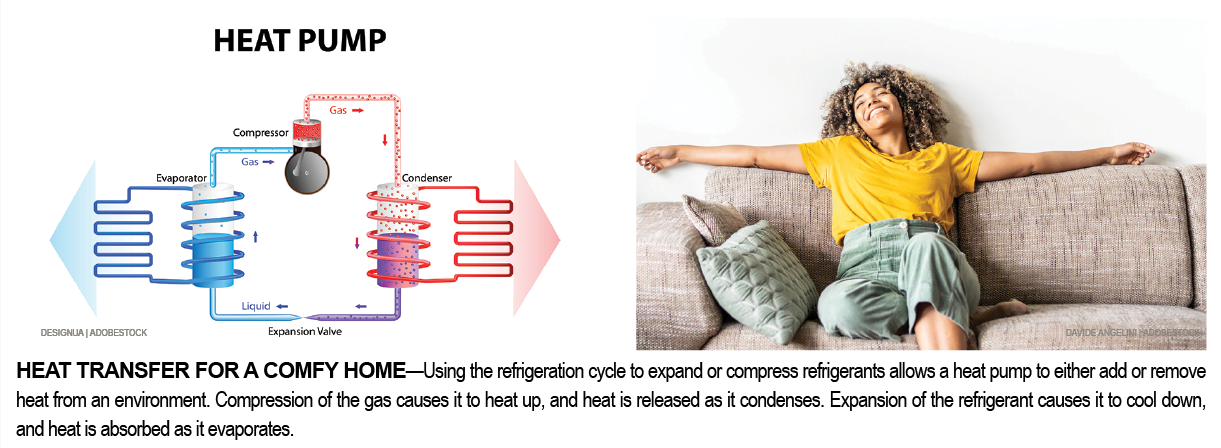Heat pumps transfer heat from one place to another for heating and cooling a home, and their versatility in applications keeps growing.
by
RYAN HOERNER
In North Texas, heat pumps have become the energy-efficient standard for maintaining comfort in homes heated and air conditioned by electricity. These systems work by transferring heat from one location to another rather than generating it, making them both versatile and sustainable. Whether for heating during winter or cooling in summer, heat pumps can serve both functions.
How Do Heat Pumps Work?
The principle of heat transfer explains how a heat pump operates. A heat pump utilizes a refrigeration cycle to absorb heat from one location and release it into another, employing a compressor, an expansion valve, and two heat exchangers. Unlike traditional furnaces, heat pumps do not create heat. They transfer existing heat from external sources such as air, the ground or water into a building, or vice versa.
Heat pumps also make use of the refrigeration cycle to achieve energy efficiency. In heating mode, the pump extracts heat from the outside environment and moves it indoors. In cooling mode, the reverse process occurs, with the pump absorbing heat from inside the building and releasing it outdoors. This dual functionality enables heat pumps to maintain comfort throughout the year. The magic happens through the refrigerant, a special fluid that absorbs and releases heat as it changes states from liquid to gas and back again.

Residential Heating and Cooling
Heat pumps have revolutionized the way homeowners manage heating and cooling in their homes. Their ability to both heat and cool a home with a single system makes them an ideal choice for residential comfort. Air-source heat pumps (ASHPs) work well in moderate climates, where extreme low temperatures rarely occur. These systems offer affordability, easy installation and significant savings in energy costs compared to traditional electric systems. For colder regions, cold-climate heat pumps operate efficiently even in temperatures as low as minus 15 degrees Fahrenheit, ensuring year-round comfort.
For members seeking a more sustainable and long-term solution, geothermal heat pumps, which tap into the earth’s constant temperature, provide excellent energy efficiency. While these systems require a larger upfront investment, they have lower energy costs and have proven highly effective in both heating and cooling larger homes.
Ductless, or mini-split, systems also commonly utilize heat pump technology. These ductless systems offer a good option for smaller, open-concept homes or for those who do not want ductwork in their attic. Smaller than traditional heat pumps, these systems only require two small wall penetrations for the refrigerant and condensation lines that connect the indoor and outdoor units. In addition to the space savings, ductless systems cost considerably less than ducted HVAC heat pump systems. The outdoor unit on some ductless systems can also have the option of connecting to multiple indoor units, allowing for multiple conditioned spaces in the home separated by walls or doors.
Water Heating
Heat pump water heaters have also become an increasingly popular option for residential water heating. These systems work by extracting heat from the surrounding air and using it to heat water for domestic use. United recommends installing heat pump water heaters in unconditioned spaces such as a garage. Energy efficiency puts air-source heat pump water heaters in demand. They use electricity to move heat rather than generating it directly, making them up to three times more efficient than traditional electric water heaters, according to the U.S. Department of Energy.
Installing a heat pump water heater system in a home has advantages in both savings and sustainability. While the initial cost of an air-source heat pump water heater can exceed traditional water heaters, the long-term savings in energy bills often offset the investment. Currently, United offers a $150 rebate to any member who installs a heat pump water heater in their home (please see the 2025 Rebate Application at ucs.net/rebate-programs for more details).
Clothes Dryers
Heat pump clothes dryers offer an energy-efficient alternative to traditional electric or gas dryers. Unlike conventional dryers, which use high heat to evaporate moisture, heat pump dryers circulate warm air through a heat exchanger to extract moisture from clothes. The moisture-laden air condenses, reusing the heat to dry the clothes, making the process far more energy-efficient.
This closed-loop system reduces heat loss to the environment, lowering electricity consumption. Additionally, heat pump dryers operate at lower temperatures, making them gentler on clothes, helping preserve fabric quality and reducing wear over time. The initial outlay for a heat pump dryer generally exceeds the cost of traditional dryers, but the long-term savings in energy costs can provide a valuable savings opportunity for homeowners in the long run.
Swimming Pools
Heating a swimming pool with traditional methods can increase energy bills significantly. Therefore, heat pumps have emerged as a popular and energy-efficient option for pool heating. These pumps operate similarly to air-source heat pumps, extracting heat from the outside air and transferring it to the pool’s water. Pool heat pumps show effectiveness in various climates but have proven especially efficient in regions with mild to moderate year-round temperatures. Although heat pumps provide an efficient way to heat a pool, United warns members to avoid running these excessively, as they can amount to a significant increase in monthly electric usage.
Electric Vehicles
Heat pumps in electric vehicles (EVs) enhance energy efficiency, particularly in colder climates. Unlike traditional internal combustion engine vehicles, which generate heat naturally from the engine, EVs rely on electric systems for temperature regulation. A heat pump in an EV uses a small amount of electricity to transfer heat from the outside air into the cabin or battery system, enabling the vehicle to heat up without draining excessive energy from the battery.
Heat pumps also function in reverse, acting as air conditioners during warmer weather by extracting heat from the cabin and expelling it outside. By optimizing thermal management, heat pumps improve battery performance and increase the driving range of EVs in various weather conditions, providing a more efficient experience for drivers.
As the world shifts toward more sustainable energy solutions, the role of heat pumps in residential applications will only continue to grow. Heat pumps play a crucial role in reducing energy consumption and carbon emissions, making them a key component in modern energy-efficient homes. From home heating and cooling to water heating, pool heating, and even clothes drying, heat pumps provide an all-in-one climate control system.
Innovations in heat pump technology make these systems even more adaptable to different climates and applications. Developments such as cold-climate models, solar panel integration, and the innovation of heat pumps into new appliances further solidify their position as a cornerstone of energy-efficient, sustainable living. This makes heat pumps an essential tool for United members seeking to reduce energy costs and environmental impact while ensuring year-round comfort.


